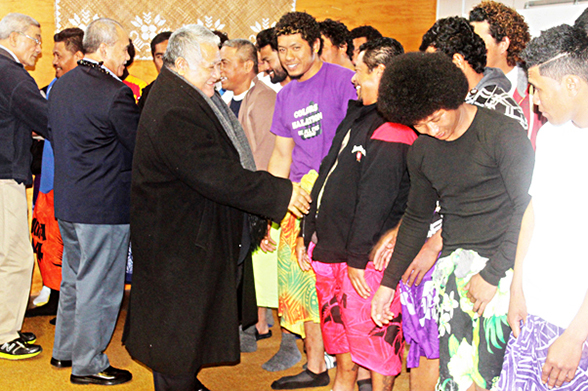By Staff Writer
Controversial claims by Samoan Seasonal Workers in Australia of being ‘treated like slaves’ is being investigated by Samoa’s High Commission and Trade Commission offices in Australia.
The findings from the inquiry will determine what official action Samoa takes in response to any abuse or exploitation of workers.
“What we can do if our workers were indeed mistreated as claimed, is to no longer send any more people to the farming employer responsible,” the Ministry of Commerce Industry and Labour CEO Pulotu Lyndon Chu Ling threatened.
His Ministry is responsible for co-ordinating the seasonal workers scheme under a special division set up for it.
An Australian Senate hearing has learned from workers personal accounts of being paid less than what they signed up to before they left Samoa.
How they were squeezed into small squalid living quarters were also a main concern raised.
Muese and Talipope Kalolo spoke before the Senate on behalf of the Samoan fruit picking workers in Victoria of the poor treatment.
“The way we are made to work through the heat of the sun or rain, without rest, we feel like we are being treated like slaves,” Mr Muese complained at the hearing.
Muese and his working team were expecting to be paid $25 an hour on a five-day working basis, but the conditions changed when they arrived.
They were made to sign contracts in English, despite not understanding the language, and were not provided with an interpreter to understand the terms.
His fellow worker Talipope Kalolo said his negative experiences have tainted any prospect of continuing to work in Australia.
“I’d be better off going back [to Samoa] and doing some development or plantation work,” he said.
“I’m definitely very heartbroken about this whole thing.”
The exploitative conditions Alex Muese and Talipope Kalolo outlined at the Senate hearing on job security are being watched very carefully from Samoa by the seasonal scheme co-ordinators.
“Our workers are prepared well before they leave through a series of orientation training organised for them on what to expect and be aware of in Australia,” CEO Pulotu explained.
“One on one question and answer sessions with scheme officials to explain their working contracts is an essential part of their preparations.
“ By the time they leave they are as prepared as they will ever be for what to expect when they arrive for work,” Pulotu added.
He objected strongly to reports of workers signing up a second working contract and the variations different from the contract signed in Samoa.
“They should have contacted us first to discuss any variations in this second contract and it is this lack of communications that is responsible for the complaints that are coming out.”
CEO Pulotu added that this is a new issue to appear from the scheme outside the normal alcohol and accommodation related concerns of the past.
He suspects that the global economic setbacks from the COVID 19 pandemic may have in some ways affected the farming community in Australia.
The likely suggestion of farming employers taking cost cutting measures holds some truth with New Zealand cutting it’s intake for the year down to only 2000 workers.
“It’s a noticeable reverse from their usual workers intake of up to 4000 and the effects of the COVID pandemic is largely responsible.
“Australia on the other hand intake is normally around 1000 plus workers, but it has gone up to 3000 this year.”
Samoan worker are not the only ones complaining of the bad treatments, so too are other islands workers in the regional scheme.
Vanuatu worker complaints are the first to be heard publicly and now it is Samoa making all the angry noises.
Australia is where all these unhappy reactions are coming from unlike New Zealand where nothing out of the usual are heard.
New Zealand is seen as very well organised from the many years of experience and fine-tuning their organising skills in looking after the workers better.
Samoa is adding a second liaison officer in Australia to start on the job sometime this month to meet the workers demands and requirements.
The seasonal working scheme has had a considerable economic and social impact in Samoa from the benefits of employment that flows directly to families in the villages.
The promise of building better homes and other conveniences like a family car has given it a fairy tale happy ending touch.
Large crowds of people are seen outside the MCIL office almost everyday going through the necessary paper work to be completed for recruitment into the scheme.
The angry outburst of slave-like treatment complaints these past few days should come as a hard reality wake up call to land the feet back on solid ground for many people in Samoa.
The Australian Senate inquiry into the whole scheme and the painful truth heard from all the workers in the regional scheme, promises hope for improvements in the future.
